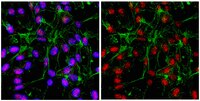ABD16 Sigma-AldrichAnti-IKAROS Antibody
Anti-IKAROS Antibody detects level of IKAROS & has been published & validated for use in WB & IC.
More>> Anti-IKAROS Antibody detects level of IKAROS & has been published & validated for use in WB & IC. Less<<Productos recomendados
Descripción
| Replacement Information |
|---|
Tabla espec. clave
| Species Reactivity | Key Applications | Host | Format | Antibody Type |
|---|---|---|---|---|
| H, M, R | WB, ICC | Rb | Affinity Purified | Polyclonal Antibody |
| References |
|---|
| Product Information | |
|---|---|
| Format | Affinity Purified |
| Control |
|
| Presentation | Purified rabbit polyclonal in buffer containing 0.1 M Tris-Glycine (pH 7.4), 150 mM NaCl with 0.05% sodium azide. |
| Quality Level | MQ100 |
| Physicochemical Information |
|---|
| Dimensions |
|---|
| Materials Information |
|---|
| Toxicological Information |
|---|
| Safety Information according to GHS |
|---|
| Safety Information |
|---|
| Storage and Shipping Information | |
|---|---|
| Storage Conditions | Stable for 1 year at 2-8°C from date of receipt. |
| Packaging Information | |
|---|---|
| Material Size | 100 µg |
| Transport Information |
|---|
| Supplemental Information |
|---|
| Specifications |
|---|
| Global Trade Item Number | |
|---|---|
| Número de referencia | GTIN |
| ABD16 | 04053252527524 |
Documentation
Anti-IKAROS Antibody Ficha datos de seguridad (MSDS)
| Título |
|---|
Anti-IKAROS Antibody Certificados de análisis
| Cargo | Número de lote |
|---|---|
| Anti-IKAROS - 2137011 | 2137011 |
| Anti-IKAROS - 2091443 | 2091443 |
| Anti-IKAROS - 2188560 | 2188560 |
| Anti-IKAROS - 2194087 | 2194087 |
| Anti-IKAROS - 2239141 | 2239141 |
| Anti-IKAROS - 2275635 | 2275635 |
| Anti-IKAROS - 2298436 | 2298436 |
| Anti-IKAROS - 3276094 | 3276094 |
| Anti-IKAROS - NRG1862168 | NRG1862168 |
| Anti-IKAROS -2520507 | 2520507 |








